Microsoft Surface customers have been complaining about slow WiFi speeds using their Surface Pro 3’s in Microsoft Communities and elsewhere. I wanted to clearly frame this issue for anyone that might be interested. (Microsoft are you listening/reading?)
As I’ve stated before, the very fast 802.11ac speeds only are achieved on a 5GHz SSID. Folks with single band 802.11 (2.4 GHz) routers are not going to achieve the fast speeds that 802.11ac offers. Given that nearly all of the public WiFi access points are 2.4GHz only (Starbucks, McDonald’s, etc.) and that the Surface Pro 3 has severe performance issues with the Marvell wireless radio when using the 2.4 GHz band, it’s easy to see why there are so many unhappy campers. I’ve written about tweaks that folks can use at home, but these provide only incremental speed boosts when attached to a 2.4 GHz network using the Surface Pro 3. The speeds obtained are dreadful when compared to just about any other wireless adapter on any other similarly equipped computer and far less than can be obtained when using a USB wireless 802.11ac adapter on the SP3, and using the 2.4 GHz band (as you will see).
All of my testing was done from the same location in my home, in my living room on the first floor with the Netgear R7000 router on the 3rd floor. I tested with speedtest.net and my ISP provisioned speed is 105/10.
Testing with my ASUS ROG “desktop replacement” which has a Broadcom 802.11ac built in adapter:
As you can see, my speed exceeds my provisioned speed.
| 5 GHz | 2.4 GHz |
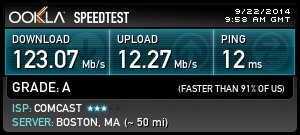 |
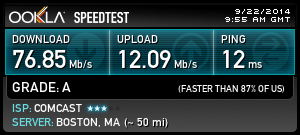 |
Testing with my Surface Pro 3:
Still getting great speeds on 5 GHz, but totally dismal speeds on 2.4 GHz.
| 5 GHz | 2.4 GHz |
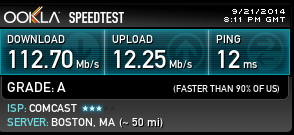 |
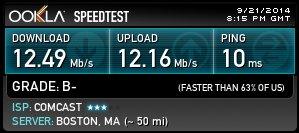 |
Others report even less that the 12.49 speed I can achieve. It’s crazy bad.
Disabling the onboard WiFi in the Surface Pro 3 and using a Netgear AC600 802.11ac adapter:
While the SP3 has a USB 3.0 port, the wireless adapter, like almost all the other 802.11ac USB mini adapters available today, is still only USB 2.0. While USB 2.0 has a theoretical 60 Mb/s rating, most folks have found that it tops out at 40 Mb/s in the real world on all devices.
| 2.4 GHz |
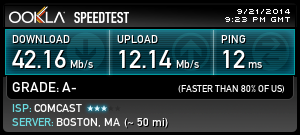 |
So even with the restriction of USB 2.0 speeds, the difference between the Marvell wireless and the Netgear USB 802.11ac adapter performance is alarming.
It’s infuriating to customers that Microsoft hasn’t addressed the issue or even commented specifically about it. Is 12.49 Mb/s fast enough to check email? Sure, if you don’t have lots of attachments. But is it what people expect of a $1400 device? No way.
If you want to share YOUR speed tests with me, tweet them to @barbbowman